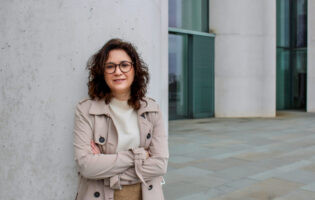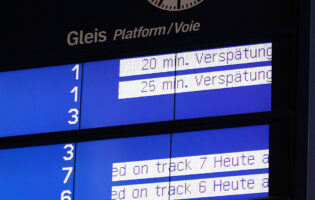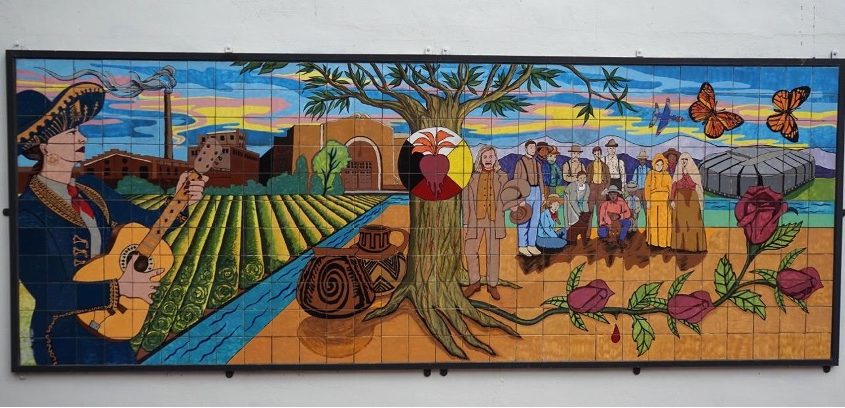
Glendale community mural viewed on AICGS walking tour
“The Capacity to Step into Someone Else’s Shoes”
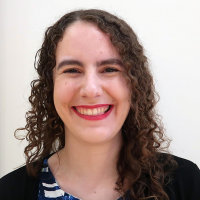
Alexandra Hoenscheid
German-American Heritage Museum and Afford Your Travel
Stemming from a lifelong appreciation of diverse cultures and perspectives, Alexandra Hoenscheid has dedicated her career to strengthening citizen exchange programs and extending them to new audiences. Ms. Hoenscheid is the founder of Afford Your Travel, which expands access to travel to underprivileged and underrepresented groups with the aim of enriching intercultural dialogue. She also showcases the contributions of German immigrants at the German-American Heritage Museum. Most recently, she has advanced and promoted German-American exchange as a Kathryn Davis Fellow for Peace at the Middlebury College German School, as a Germany Grant Consultant for Sister Cities International, and as a Program Coordinator at American Friends of the Alexander von Humboldt Foundation. Ms. Hoenscheid graduated summa cum laude as a Washington Scholar from the University of Mary Washington with a B.S. in International Business and a minor in Business German. She also spent a year studying Economics at the University of Zurich in Switzerland.
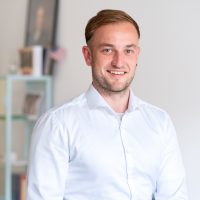
Friedrich Opitz
German-American Institute Saxony (DAIS)
Friedrich W. Opitz fosters exchange between global and local perspectives, currently as deputy director at the German-American Institute Saxony in Leipzig (DAIS). This means moderating dialogue at the intersection of academia, politics, and civil society, and Friedrich hopes to promote inclusive structural development that incorporates the perspectives and experiences of residents in regions on both sides of the Atlantic. Friedrich holds an M.A. in International Relations with a focus on International Economics from Technical University Dresden, and a B.A. in American Studies from Leipzig University. For researching the interplay of economic transformation and populist movements in the past decade, Friedrich spent extensive time in Ohio, the French Alsace, and Central Germany. He has previous experience with the Berlin-based think tank Das Progressive Zentrum.
How Local Initiatives Drive Cohesion and Global Progress
“Social cohesion depends on the capacity to step into someone else’s shoes.” What emerged as a collective working definition for our research group could easily evolve into a motto for our program. In a way, it summarizes our diverse experiences during the first leg of our program. As participants of AGI’ss Social Divisions and Questions of Identity in Germany and the United States program, we gathered in Glendale, Arizona, in September 2022.
Academic, public, and media discourse in recent years is filled with new opinions on social divisions and political polarization, both in Germany and in the United States. Although many definitions of social cohesion circulate, it appears to encapsulate the acceptance and empowerment of different communities and points of view to form stable, prosperous, and viable democratic structures. Other elements of social cohesion include shared values, the (e-)quality of life, an interest in the common good, identifying with one’s surroundings, belonging, the acceptance of diversity, and more.
We always considered our localized discussions of social cohesion within a global context. We discussed how social cohesion is especially challenged (or called for) in times of crisis and rapid transformation, recently including Russia’s war of aggression on Ukraine and the resulting migration, inflation, and energy crises. Meanwhile, political polarization and extremist views are on the rise domestically, often with global implications. Amidst these sources of division, transatlantic knowledge transfer can yield innovative insights and solutions on social cohesion, countries’ experiences can be compared, and lessons can be learned.
Global progress often starts with local solutions. Considering social cohesion with Glendale as a case study enabled us to hold specific discussions on social cohesion, include a community outside the major cities in broader discussions, and devise tangible recommendations. Our local observations and solutions have the potential to inform broader transatlantic discussions on shared challenges and find application elsewhere.
Arizona, Glendale, and the State of Social Inclusion
With more than 300 days of sun per year, Glendale is a typical “Sunbelt City” in Arizona, called the Grand Canyon State. Home to the Navajo Nation, the largest Native American reservation, Arizona is also known for its five Cs—cotton, copper, citrus, cattle, and climate—that have been attracting people to the region for many decades. With the intensifying climate and water crisis in the area, agriculture becomes less and less viable, and communities opt for new revenue streams. For the past decade, the city of Glendale has pushed an economic transition towards commercial sectors, attracting global investments from companies like Red Bull or Amazon and experiencing resurgent growth. Military investments form another sector of Glendale’s economy, where its air force base trains pilots on F35s, including those from NATO allies.

One issue for national politics both in the United States as well as in Germany is connecting and translating politics into the livelihoods of people in more disparate and harder-to-engage communities—in other words: connecting national politics and their resources with local issues. Especially outside larger metropolises, elected federal officials can easily lose touch with differing realities in more rural constituencies and vice versa. “We take cases from people who hate us,” one senate constituent services staffer put it at our meeting with Senator Mark Kelly’s team. The constituent services office connects federal agencies and their resources with locals all over Arizona, helping people and NGOs understand what federal services are available to them and how to access them. The senator’s team works from local outreach posts and really gets its ears on the ground in communities far removed from urban centers that otherwise do not have regular access to politicians at the federal level. This enables policymakers to allocate federal resources to these underserved local constituents and empowers them by meeting their needs.
Although home to diverse populations, Glendale is somewhat limited by its lack of official spaces and initiatives to improve social cohesion. A meeting with Glendale Mayor Jerry Weiers yielded few examples of cohesion or inclusion initiatives and even suggested that bias may affect the city leadership’s engagement with marginalized groups. At least some local media also do not appear to be well-connected to Glendale’s minority communities, such as the city’s significant Hispanic population. Perhaps the greatest challenge for cohesion is Glendale’s lack of public spaces, in terms of both Glendale’s lack of a central downtown and its lack of community spaces. Glendale residents would greatly benefit from spaces designated for diverse groups to gather, exchange perspectives, and provide feedback to city officials. However, local communities have nevertheless stepped up to create their own social cohesion and inclusion initiatives.
Discussing local solutions and forming long-term connections through person-to-person diplomacy can not only improve social cohesion, but also improve understanding of shared transatlantic challenges and initiate lasting multilateral collaborations.
As one example, places of worship can deliver crucial contributions to public infrastructure to foster cohesion and communal life. “Sunday worship hour has historically been the most segregated hour of the week, but we’re starting to change that to make our churches more reflective of the diversity of the community.” This is how a local pastor of Glendale’s First United Methodist Church contextualized his church’s efforts to cater more to their surrounding communities’ diversity. In this meeting, we learned about the church’s public community events, services for the homeless, interest in future interfaith dialogue, and desire to help the LGBT+ community feel welcome.
Educational institutions such as Glendale Community College also both expand access to affordable university education and strengthen students’ cohesion through Diversity, Equity, and Inclusion Council policies. These policies also serve as a valuable template for other organizations. Similarly, we met with practitioners considering many dimensions of equity and inclusion for minority and special needs children in K-12 schools. Various city collaborations also promote the value of other cultures and carry out needed community projects.
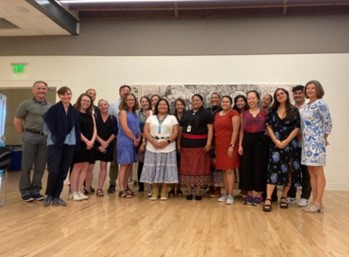
In many cases, those making a difference in social cohesion and progress are members of minority communities themselves. They are ultimately the drivers of much of Glendale’s social inclusion. Native American Connections provides culturally appropriate health, affordable housing, and community development services to tribal communities and the general public. They also educate the public on the horrors of Native American boarding schools and treatment and on the challenges in infrastructure, policy, and recognition faced by Native American communities today.
The Empowering Potential of City Collaborations
Even in the absence of federal or municipal support or cohesion initiatives, local organizations have also stepped up to address community challenges, initiate external partnerships, and ultimately advance solutions to social divisions within Glendale. Glendale Sister Cities is part of Sister Cities International, which works to promote peace through city partnerships with the potential to foster inclusive exchanges, appreciation for other perspectives and cultures, and vital city collaborations. Glendale Sister Cities fosters this mission through its partnership with Memmingen, Germany.
The exchange with Glendale Sister Cities included a discussion of their planned initiatives and a brainstorming of ideas for improving social cohesion through more inclusive youth exchange. Ideas included virtual classroom exchanges, scholarships, and diversified outreach. Establishing and expanding access to German-American youth exchanges would strengthen social cohesion and inclusion but ultimately will depend on whether the city of Glendale is willing to fund Glendale Sister Cities and its vital initiatives.
Local University and Student Initiatives Driving Cohesion
At Arizona State University, student groups are helping to drive regional progress on a variety of local issues. ASU Project Cities, part of ASU’s Sustainable Cities Network, convenes university-community partnerships to “co-create strategies for better environmental, economic, and social balance.” Students, along with faculty and community partners, research issues chosen by the city and advise city staff on sustainable solutions. The city of Glendale participated in this program from 2018 to 2019 and carried out multiple projects with hundreds of students across six schools. Many projects focused on devising sustainable environmental solutions with wide-ranging social impacts and two projects addressed social cohesion and inclusion strategies more directly.

Glendale’s investment of time and money in these projects shows a promising interest in improving social cohesion. The fact that Glendale requested two student-driven community engagement projects also suggests a potential interest in improving outreach to different groups. For the digital media policy project, students devised an inclusive content strategy for Glendale’s first social media manager, including measures to better engage with the local Hispanic population. The multi-generational engagement project is especially promising, with the purpose of identifying “people in younger, under-served, lower-income, and vulnerable population groups (that) are often excluded from processes” affecting them and finding “ways to include their voices in city forums.”
Social cohesion is at the very heart of this project, which recommends community spaces and forums, online feedback, and a Youth Advisory Council among other strategies. Certainly, the extent to which these recommendations are actually implemented and funded by the city are the true test of the city’s values.
Immediate Takeaways from Glendale
With municipal support, there is great potential for Glendale to strengthen its social cohesion and inclusion. City funding and promotion for existing initiatives would be the easiest to implement. For example, Glendale only partnered with and provided funding for ASU Project Cities from 2018 to 2019 and has not yet provided any financial support or promotion for Glendale Sister Cities. However, continued funding could enable ASU Project Cities to plan additional community and sustainability projects, with additional funding recommended for the projects’ implementation. Dedicated funding could also enable Glendale Sister Cities to relaunch and expand their planned visits and student exchanges and enable scholarships for underprivileged students. Funding could even enable new community collaborations. For example, more funding could allow ASU Project Cities to collaborate with Glendale Sister Cities to also carry out projects in Memmingen, which could add a global exchange dimension to the ASU community projects and a community engagement dimension to the sister city relationship.
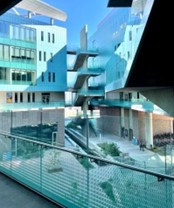
While requiring more resources and partnerships, the creation of community spaces will also be vital for creating dialogue between diverse groups, building a stronger sense of city community, and providing direct feedback to the city. The ASU Project Cities Multi-Generational Engagement Project Report provides excellent recommendations to this end. The project’s idea of hosting city-sponsored “Conversation Cafés” at local businesses could instantly enable informal dialogue. Organizations such as the Nonprofit Centers Network may also be willing to establish permanent community spaces. Participatory Town Halls and an online platform for residents to engage, organize events, and provide feedback would also enable diverse communities to connect directly with city officials and raise general awareness of their concerns. Finally, the city should establish a registration-based directory of community organizations, improve their outreach to these groups, and arrange regular meetings with their representatives. These mechanisms would enable diverse communities to learn about each other, be heard by the city, and mobilize advocacy for policies that meet their needs.
Looking Forward to Memmingen, Germany
Arguably, the state of Bavaria and the town of Memmingen signify an entirely different playing field from Arizona. Bavaria is among Germany’s most internationally-known, prosperous, and successful federal states. The state enjoys significant national political leverage through the Bavaria-based Christian Social Union (CSU) party, which forms a political union together with the national Christian Democratic Union party as the more Christian and conservative sister party. When someone abroad hears of Bavaria, they think of Oktoberfest, Sauerkraut, and brass music. Underneath that surface, however, one can find an intriguing story of transition from a mostly agricultural socioeconomic structure after World War II to a world market-leading location for high-tech industries throughout the second half of the twentieth century and early twenty-first century.
Glendale and Memmingen are also similar in that they are adjacent to larger cities and harbor more political conservatism and a somewhat less diverse population than these cities. As an even smaller and more conservative town, it will also be interesting to see how Memmingen’s social cohesion challenges and initiatives—and the city leadership’s approach—compare with Glendale. In any case, Glendale provided participants with promising examples of community-based cohesion initiatives that serve as ideal templates to share with Memmingen. Regarding the larger transatlantic picture, the first leg of our program already supports the thesis that regional comparative analyses carry many benefits for national and international discourse, especially for decision-makers in Berlin, Brussels, and Washington, DC. Discussing local solutions and forming long-term connections through person-to-person diplomacy can not only improve social cohesion, but also improve understanding of shared transatlantic challenges and initiate lasting multilateral collaborations.



